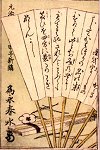
|
|
|
|
|
 |
 |
 |
 |
 |
 |
|
|
|
Toward the Future Even before the death of the Meiji Emperor, Japan had become an important power in the modern world. Not all its gains had been made through warfare, although its victorious campaigns in China and Russia had shown other nations that Japan could defend itself and was even capable of extending its power. Clearly, the most significant advances in the late Meiji period were in industry and education. One of the earliest steps of the first representational government was to form a Ministry of Education. The first Imperial decree for the encouragement of education came in 1872, and by 1912, when the greatly respected Meiji Emperor died, most of its provisions had become fact. The decree read in part: ''There shall, hereafter, be no illiterate family among the people of any community, nor shall there be an illiterate member in any family ... learning is the basis for all human endeavor from the commonplace speaking, reading, writing and calculating for everyday needs, to the professional needs of the military man, government official, farmer, merchant, craftsman and artist, in the multitude of technical skills and arts and in law, polities and astronomy." One sentence in the Rescript on Education issued by the Meiji Emperor,''Devote yourself to public service in a national emergency,''helped to unify the Japanese people during the Sine Japanese and RussoJapanese Wars. The first state educational institution, Tokyo University, was founded in 1877, and within thirty years four other universities were opened. Japanese architecture was beginning to influence the architecture of the modern world, and Japanese painting was having a distinct influence on the evolution of the French impressionist school. Japanese industry occupied a solid and respectable position in the world market. The country, which had been an isolated and feudal state just sixty years before, had became one of the great powers of the modern world.
|
